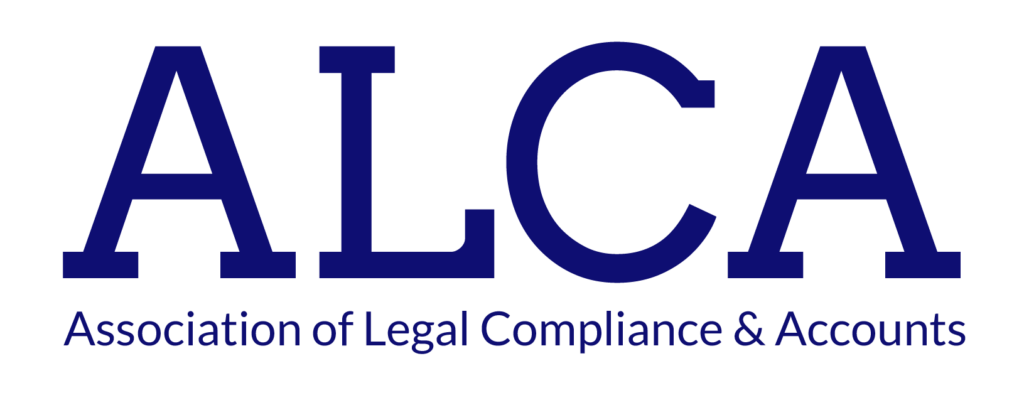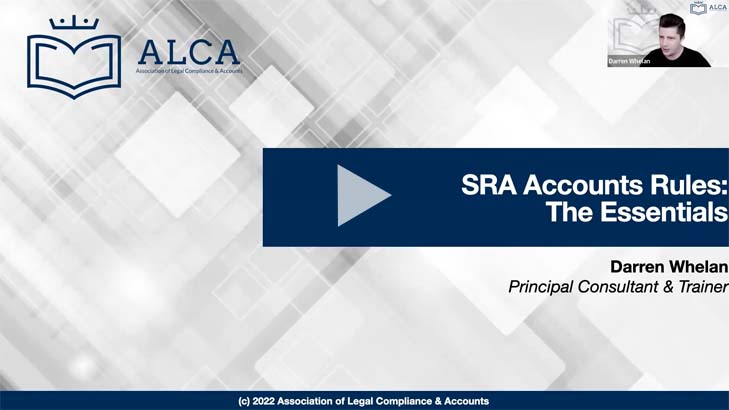SRA Accounts Rules – The Essentials
Speaker: Darren Whelan
Length: 2.5 Hours
Published September 24, 2022
Last Updated on May 1, 2023
Who is this training for?
This on demand workshop is for Solicitors, Lawyers, Accountants, Compliance Officers, COFA’s, Legal Accounts Professionals, Legal Cashiers and anyone that has any involvement in working in legal finance and compliance.
Purpose of this training?
The current SRA Accounts rules allow more flexibility in how law firms operate and manage risk but also require firms to make their own professional judgements and decisions in how they protect client money and assets entrusted to them.
This on demand workshop will explore the technical and practical application of the accounts rules and best practice to ensure compliance. It will address issues that have emerged from the warning notices guidance that has been subsequently released and will look at conundrums, scenarios and recent Solicitors Disciplinary Tribunal decisions.
- Introduction
- Client Money and Client Bank Accounts
- Legal Aid Money
- Client Account Exemption
- Management of Money and Timeframes
- Residual balances
- Banking Facilities
- Systems and Controls
- Client Bank Reconciliations
- Joint Accounts/Client Own Accounts
- Breaches
- Third Party Managed Accounts (TPMA’s)
- The Role of the Accountant and the Report
- SRA Additional Guidance
- Summary of the Changes 2011 -v- 2019
#1. You have instructed an interpreter in order for your client to be able to communicate with you or to enable your client to understand Court proceedings. The cost of the interpreter is being passed on to the client. When billed, the cost is:
#2. You instruct a medical reporting agency to obtain copy-medico legal documents on behalf of a client that has been involved in a road traffic accident.
Is this cost a disbursement for VAT purposes or a recharge?
#3. You have paid a disbursement from the business account and now have sufficient money held in the client account towards it.
Are you required to send the client a bill or other written notification of costs prior to transferring the money from the client account to the business account?
#4. When dealing with residual balances, instead of recording the payment to the charity from the client’s ledger, your firm moves the residual balance to a ledger in the name of the charity. The payment is then recorded and made from that ledger every six months.
Is this a breach of the SRA Accounts Rules?
#5. Your firm prepare a lot of wills and fixed fee interviews as one-off transactions for clients. However, instead of opening an individual client ledger for each client, you have a general ledger on which you record the details of each client and the costs received.
Is this a breach of the SRA Accounts Rules?
#6. If you receive notification of an SRA Forensic Investigation, does the SRA provide a reason?
#7. Money received from the Legal Aid Agency on account of disbursements that are not yet incurred or paid is?
#8. You’re firm is acting for the executors in dealing with the administration of a deceased person’s estate and have sent a bill to the executors, together with the estate accounts for approval. You have asked the solicitor that is acting if you can transfer costs from the client account to the business account to discharge the bill in full. The solicitor has replied “no, as costs are not properly due”.
Is this a breach of SRA Accounts Rule 4.2?
#9. Double-entry bookkeeping refers to:
#10. True or false: the SRA Accounts Rules set out certain requirements for law firm financial statements, such as how client account should be treated on a balance sheet
Further Information
Practice notes and training sessions represent the Association of Legal Compliance & Accounts’ view of good practice in a particular area. They are not intended to be the only standard of good practice that firms can follow.
Practice notes and training sessions are not legal advice, and do not necessarily provide a defence to complaints of misconduct or poor service. While we have taken care to ensure that they are accurate, up to date and useful, we will not accept any legal liability in relation to them.
Frequently Asked Questions
Why On Demand
It’s really simple:
- Reduced cost
- Can be watched anywhere, anytime on any device – no travel time or cost
- Shorter and more efficient than face-to-face
- Recorded and can be replayed at your leisure
Online – the Cons
On Demand is not for everyone one. People learn differently and watching a pre-recorded training video can feel very lonely and isolated. It requires strong, self-motivation and time management skills. There is no opportunity to ask a question and receive an answer straight away as you would with an online or a face-to-face workshop.
No. In order to watch them, you must watch them whilst logged into the website.

